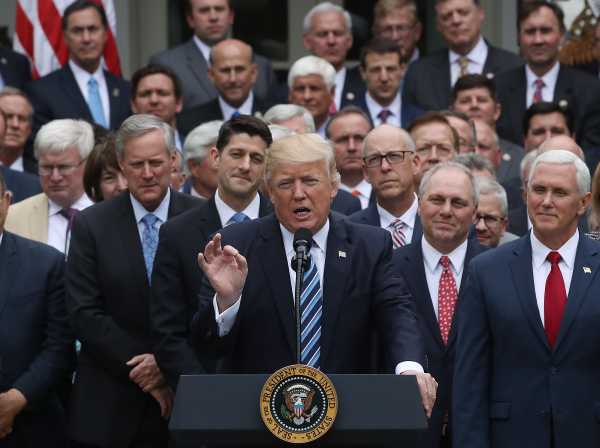
President Trump just guaranteed health care will remain a dominant issue through the 2020 presidential campaign, opening up a massive vulnerability in his reelection bid.
In a legal brief filed this week, the Trump Justice Department argued to a federal court that the entire Affordable Care Act should be found unconstitutional. That would mean an end to the private markets where 15 million Americans buy their coverage, an end to the expansion of Medicaid that covers 15 millions more, and an end to protections for people with preexisting conditions. According to the Urban Institute, if the entire law were eliminated, as the Trump administration is now advocating for, nearly 20 million fewer Americans would have health insurance.
The Justice Department’s move is stunning, considering the price House Republicans paid in the 2018 midterms for attempting to repeal the law in Congress. Health care was the top issue for voters, beating out the economy, immigration, and guns. The voters who named health care as their top issue overwhelmingly supported Democratic candidates — helping flip control of the House from Republicans to Democrats.
Polling shows Americans strongly disapprove of how Trump has handled health care as president. And now his record on health care heading into his reelection campaign is even more unambiguous: He and his administration have fought to strip health coverage from millions of Americans and to erode protections for people with preexisting conditions — and their new move in the courts shows they are keeping it up.
If Trump maintains this position heading into the 2020 campaign, his health care record could become one of his biggest liabilities. He seems to recognize this, since he routinely misrepresents his positions.
Democrats have their own disagreements to figure out, but in the end, they are arguing about how much to expand health care. Trump wants to cut it. You can expect Democrats to bludgeon the president on this issue over and over again until Election Day. The day after the DOJ said Obamacare is unconstitutional, the House Democratic majority released their plans to extend federal health care assistance to more people.
That is the winning contrast for Democrats on an issue so important to voters. Trump’s real record leaves him little room to counter them.
Trump’s health care record: repeal Obamacare and cut Medicaid
Trump will say anything when it comes to health care — including that he supports the opposite of his administration’s policies. Shortly before he took the oath of office, he said that he wanted “insurance for everybody.” He promised not to cut Medicaid. He claims he wants to protect preexisting conditions, just like Democrats do.
Of course, Trump seems illiterate about health policy at times, making comments that suggest he has no idea what health insurance actually costs, as Vox’s Sarah Kliff has noted. But his policy ignorance does not excuse his record.
Trump has supported various plans, from the Justice Department’s position in this most recent litigation to his endorsement of the Republican bills to repeal and replace the ACA, that would leave millions fewer Americans with health insurance and raise costs for people with preexisting conditions.
The GOP health care bills didn’t pass the Senate, but that doesn’t absolve Trump. In another bit of cognitive dissonance, Trump called the initial House GOP bill “mean,” but he still held a Rose Garden ceremony celebrating another version with some cosmetic changes when it passed the House. He owned with a smile the least popular major legislation in Congress in three decades.
Trump still wants to repeal Obamacare. In his most recent budget, he again endorsed the Graham-Cassidy bill put forward in the Senate, which is in some ways the most radical proposal put forward by Republicans and would lead to the same catastrophic cuts to spending, particularly Medicaid, as its predecessors.
Medicaid cuts might be Trump’s biggest broken promise. He said during the campaign, while noting this was an unorthodox position for a Republican, that he would not cut the country’s biggest insurance program. Then he endorsed Obamacare repeal bills that would have ended the ACA’s Medicaid expansion and block-granted Medicaid, slashing spending by more than $800 billion and reducing enrollment by upward of 10 million people.
That legislative overhaul was foiled. But the administration has approved Medicaid work requirements in several states, requiring for the first time that beneficiaries work in order to receive benefits. Advocates argue that these requirements are contrary to the purpose of the program. Most Medicaid enrollees would not be expected to work (children, the elderly, people with disabilities), and many of those who can work already do. The requirements do not reflect the reality of work for low-income people, whose hours are often seasonal or irregular. The reporting obligations are burdensome, and many Medicaid recipients are expected to lose coverage not because they failed to meet the work requirements themselves but because they failed to file the proper paperwork.
Already in Arkansas, the first state to fully implement a work requirement, nearly 20,000 people have been kicked off their coverage. That number could grow exponentially as more states put work requirements in place.
Trump ran as an anti-abortion candidate, and his administration has promulgated regulations to cut funding for Planned Parenthood and to give major corporations the right to deny contraceptive coverage to their workers if they so choose, after Obamacare had eliminated out-of-pocket costs for contraception for women. Trump officials have also sought to restrict abortion access in other countries, and Trump’s Supreme Court appointees recently voted to uphold conservative state restrictions on abortion.
The president’s health care record is simple: repeal Obamacare, cut Medicaid, and restrict reproductive rights.
Democrats could build on their health care success in 2020
The 2018 midterms were a remarkable role reversal in health care politics: After Republicans had run relentlessly for years on repealing Obamacare, Democrats counterattacked, using the GOP repeal bills and the lawsuit supported by DOJ to slam Republicans for trying to cut health care for millions of Americans.
It proved to be a huge success: Democrats swept their way to a sizable majority in the House and held on to several Senate seats in Trump-friendly states, losing on net just two seats despite a highly unfavorable map.
A plurality of voters in competitive House districts, 42 percent, said health care was their most important or second most important issue when they went to vote. Of those people, 77 percent backed the Democratic candidate, according to the Washington Post. Another poll found a plurality of voters (41 percent) said health care was their top priority, ahead of immigration (23 percent) and the economy (21 percent), per NBC News. A recent Fox News survey found just 37 percent of Americans approve of how Trump has handled health care, versus 52 percent who disapproved.
Democratic presidential candidates know they have an advantage on the president when it comes to health care — and they are already pressing it hard. Democrats of every ideological stripe attacked Trump over the Justice Department’s argument that the ACA is unconstitutional.
You can see the seeds of the internal Democratic disagreements over health care in those tweets. Bernie Sanders advocates for single-payer Medicare-for-all. Other Democrats are more vague, promising to fight for universal coverage but leaving the details to be figured out later.
We shouldn’t gloss over those differences. They are substantive. Sanders and the left believe private health insurance is fundamentally immoral and should be outlawed. Other Democrats aren’t willing to go that far, preferring to work within certain political constraints to achieve universal coverage. There are arguments for the aspirational and the pragmatic approach. Democratic voters will hash out that debate in the upcoming primary.
But in contrast to Trump, Democrats are united. They want to cover more Americans. The president’s record is cutting or trying to cut health care.
The economy is usually the top concern for voters, the best predictor of electoral outcomes, and that might still prove to be true. But health care has been the dominant domestic policy issue for a decade now. Democrats believe they finally have the upper hand — and Donald Trump has made himself extremely vulnerable to their attacks.
Join the conversation
Are you interested in more discussions around health care policy? Join our Facebook community for conversation and updates.
Sourse: vox.com






